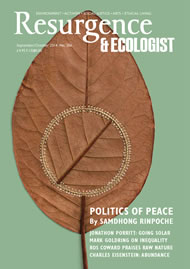Something strange is happening. Almost unspoken, an old economy is coming to an end and a new economy is arising. And it is arising out of relationship and the need for connection. It is now commonplace and is there every time we choose to share rather than possess. It is founded on empathy.
In The Zero Marginal Cost Society, Jeremy Rifkin foresees a new society emerging out of the decline, or rather the eclipse, of the old economy. The driving force for this change, he says, lies not in revolution, but in a contradiction set deep within the DNA of capitalism itself – the inherent drive for innovation and competing prices upon which growing consumption depends.
These principles are embedded at the very centre of the capitalist economy and its drive for profits. Each new product must first entice and then be unsatisfactory so that demand for the next product can arise. This is the rule of scarcity and waste that underlies the operating assumptions governing modern capitalism, the economy of “growth”. Nothing must ever be enough. There must always be a new and even more desirable product. Yet suppose, says Rifkin, we carry this to its logical conclusion. Then, as competition and innovation drive marginal costs towards zero, profits dry up and capitalism withers.
Based upon the power of the cellphone, computers and the internet, this is the endgame to which we are now being taken. The downloading and sharing of music has already wreaked havoc on the music industry; Twitter and Facebook have revolutionised communication and publishing; and online provision of university courses is beginning to have an impact in the field of education. As websites like meshing.it show, a whole new economy of sharing is emerging – cars, rooms, toys, clothes, driveways to park in, time and personal skills.
A new industrial revolution is under way. The first arose and then declined, being replaced by the second, which is now being replaced by a third. The driver for each one has been new forms of energy and new systems of communications – coal, steam and trains; oil, electricity and cars; and now renewable energy and telecommunications – an “Internet of Things”. The third industrial revolution is quite unlike its predecessors, because for the first time it is based not on competition, but on collaboration – the “Collaborative Economy”, a sharing economy, based upon principles of using, not owning.
This requires that we rethink all of our ideas about possession and ownership, re-examine what is ‘mine’ and what is ‘ours’. Rifkin captures this in a second proposition, which he calls the “Collaborative Commons”. The commons pre-dates capitalism and is the oldest form of institutionalised, self-managed activity in the world. In contrast to the capitalist market of material gain and property rights, it is collaborative, open and transparent, and, says Rifkin, it is most suited to the new economy.
This world of sharing is gaining ground, and whilst there will no doubt be attempts to capture it in the old economic order, it might not be possible to do so. Indeed, says Rifkin, the rise of the collaborative economy may bring about the slow demise of the old capitalist system and the rise of a new economy in which welfare is measured less by the accumulation of market capital and more by the aggregation of social capital.
Above all else, this new economy requires that we take down the barriers between us and let go of the need to possess in order to be. It requires that we connect and relate to each other. So, if oil was the driver of the second industrial revolution, is empathy the new oil?







